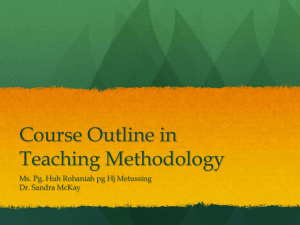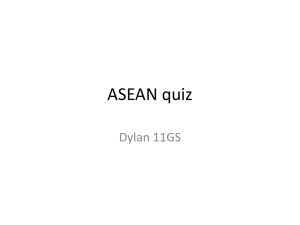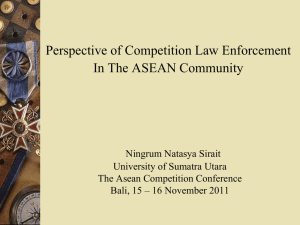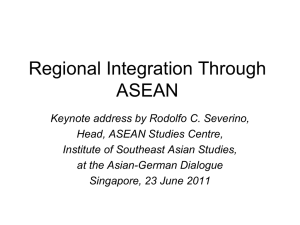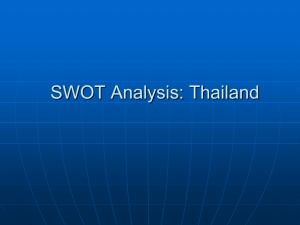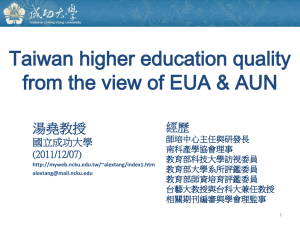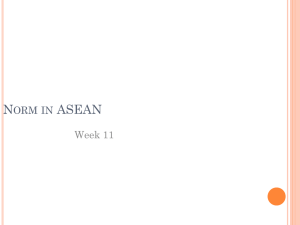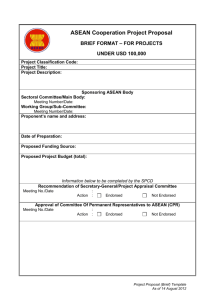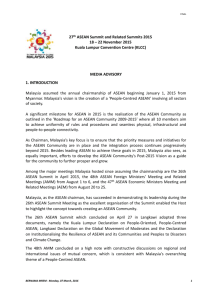Bohol Poll 7 results released - Management Association of the
advertisement
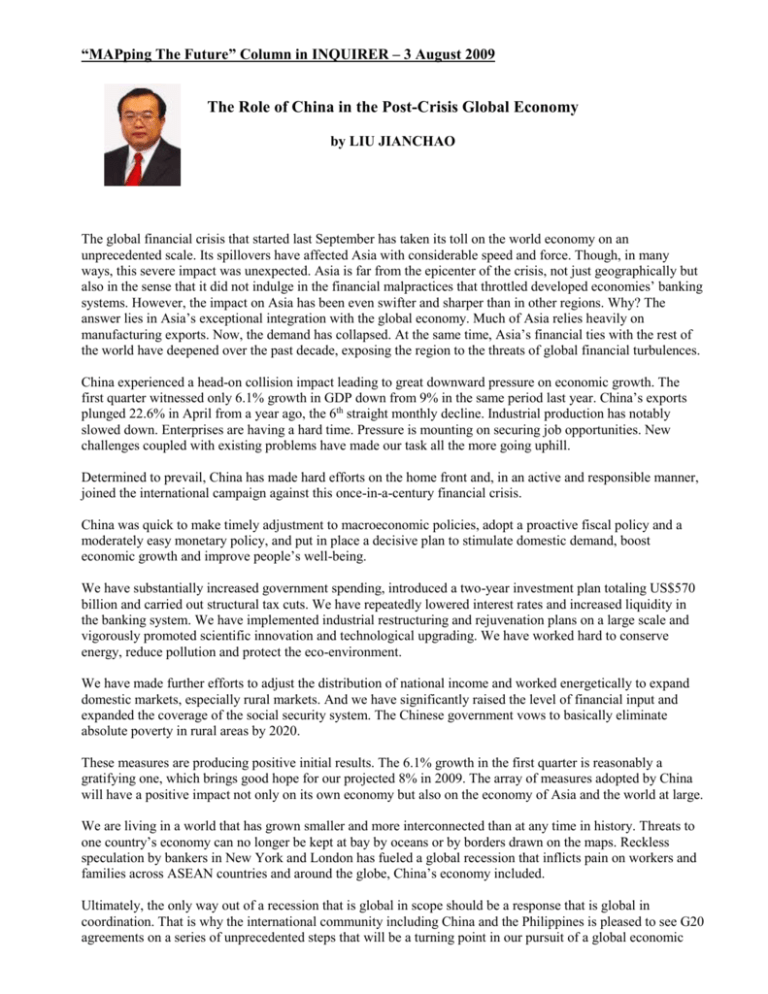
“MAPping The Future” Column in INQUIRER – 3 August 2009 The Role of China in the Post-Crisis Global Economy by LIU JIANCHAO The global financial crisis that started last September has taken its toll on the world economy on an unprecedented scale. Its spillovers have affected Asia with considerable speed and force. Though, in many ways, this severe impact was unexpected. Asia is far from the epicenter of the crisis, not just geographically but also in the sense that it did not indulge in the financial malpractices that throttled developed economies’ banking systems. However, the impact on Asia has been even swifter and sharper than in other regions. Why? The answer lies in Asia’s exceptional integration with the global economy. Much of Asia relies heavily on manufacturing exports. Now, the demand has collapsed. At the same time, Asia’s financial ties with the rest of the world have deepened over the past decade, exposing the region to the threats of global financial turbulences. China experienced a head-on collision impact leading to great downward pressure on economic growth. The first quarter witnessed only 6.1% growth in GDP down from 9% in the same period last year. China’s exports plunged 22.6% in April from a year ago, the 6th straight monthly decline. Industrial production has notably slowed down. Enterprises are having a hard time. Pressure is mounting on securing job opportunities. New challenges coupled with existing problems have made our task all the more going uphill. Determined to prevail, China has made hard efforts on the home front and, in an active and responsible manner, joined the international campaign against this once-in-a-century financial crisis. China was quick to make timely adjustment to macroeconomic policies, adopt a proactive fiscal policy and a moderately easy monetary policy, and put in place a decisive plan to stimulate domestic demand, boost economic growth and improve people’s well-being. We have substantially increased government spending, introduced a two-year investment plan totaling US$570 billion and carried out structural tax cuts. We have repeatedly lowered interest rates and increased liquidity in the banking system. We have implemented industrial restructuring and rejuvenation plans on a large scale and vigorously promoted scientific innovation and technological upgrading. We have worked hard to conserve energy, reduce pollution and protect the eco-environment. We have made further efforts to adjust the distribution of national income and worked energetically to expand domestic markets, especially rural markets. And we have significantly raised the level of financial input and expanded the coverage of the social security system. The Chinese government vows to basically eliminate absolute poverty in rural areas by 2020. These measures are producing positive initial results. The 6.1% growth in the first quarter is reasonably a gratifying one, which brings good hope for our projected 8% in 2009. The array of measures adopted by China will have a positive impact not only on its own economy but also on the economy of Asia and the world at large. We are living in a world that has grown smaller and more interconnected than at any time in history. Threats to one country’s economy can no longer be kept at bay by oceans or by borders drawn on the maps. Reckless speculation by bankers in New York and London has fueled a global recession that inflicts pain on workers and families across ASEAN countries and around the globe, China’s economy included. Ultimately, the only way out of a recession that is global in scope should be a response that is global in coordination. That is why the international community including China and the Philippines is pleased to see G20 agreements on a series of unprecedented steps that will be a turning point in our pursuit of a global economic recovery. All the countries are now moving aggressively to get banks lending again. All the countries are working to spur growth and create jobs. And all the countries are pondering over a most sweeping reform of our financial regulatory framework in a generation, a reform that will help end the risky speculation and market abuses that have cost so many people so much. China did not choose standing by with an on-looker’s folded arms. What China has been doing in the past eight months deserves what the international community expects from a responsible member. Despite all difficulties, China has kept the RMB yuan exchange rate basically stable. China has taken an active part in the Global Trade Finance Program of the International Finance Corporation and decided to provide US$1.5 billion as the first portion of its financial support to the Program. The Chinese large-scale overseas procurement missions always demonstrate our firm commitment to staying open to the world and contributing to global economic recovery. China has signed six bilateral currency swap agreements totaling US$23.5 billion and six bilateral currency swap agreements in local currencies worth RMB650 billion. The arrangements have enriched regional financial cooperation and strengthened regional liquidity assistance mechanism. We are ready to conclude more such agreements as circumstances may require. To counter the financial crisis, Asian countries should not only each run their own affairs well, but also step up cooperation and pull together like passengers in the same boat to promote win-win development and make Asia a key engine in reigniting world economic growth. Both China and ASEAN countries are members of the Asian family. We share a strong aspiration to strengthen cooperation to tide over the difficulties. We should support each other to overcome difficulties just like how we coped with the 1997 East-Asia financial crisis. China initiated a proposal at the 7th ASEAN plus China, Japan and the ROK Summit in 2003 to advance the Chiang Mai Initiative Multi-lateralization. Earlier this month in Bali, Indonesia, at the 10 + 3 Finance Ministers’ Meeting, China committed US$ 38.4 billion to the regional reserve pool. The promised input would be completed before the end of 2009. China will also inject US$900,000 into the 10+3 Cooperation Fund. In fighting the financial crisis, some developing countries have encountered the greatest difficulties and are more likely to be overlooked. Though also being a developing country, China is always ready to give a helping hand to our needy friends. China has decided to provide a total of US$40 million grants to Cambodia, the Laos and Myanmar to help them overcome temporary difficulties. China has also set aside 300,000 tons of rice as special reserves for the Project on East Asia Emergency Rice Reserve to bolster regional food security. And China is setting up a China-ASEAN Investment Cooperation Fund and will put in US$10 billion. China will provide the ASEAN countries with loans of US$15 billion, concessional loans of US$1.7 billion included. As an old saying goes, "Cooperation driven solely by profit will soon end once there is no more profit to gain." Making friends is about treating each other with every sincerity. Our relations with ASEAN countries are much more than economic cooperation and trade in mutual benefit. China would like to be your friend, a true friend known in time of need. The financial crisis has been around for over a year. The world seems to be in the worst economic depression since 1929. The World Bank projected a first-ever global contraction since World War II. As an IMF chief official said, all of last year’s pessimistic observations of the world economy seem to be over upbeat for this year. Mr. Haruhiko Kuroda, President of the ADB, told me that he believed the world economy would recover by the middle of next year. Immense and extensive as its impacts are, the crisis also denotes profound changes in the international system. Big powers seem to be on a relative decline while emerging economies are on a rise. The world is moving towards a multi-polar direction. Chances are that new economic relations are taking shape among countries to transcend ideologies. A world-wide discussion on green revolution and low-carbon economy undergoes with breadth and depth. So what role is China going to play in a post crisis era? There has lately been much chatter about Harvard Professor Ferguson’s coinage of the term Chimerica and the idea of G2 by Bergsten, Director of the Peterson Institute for International Economics. The British historian Timothy Garton Ash put it, the G20 summit date, 2 April 2009 may yet be marked as the day on which, through the catalysis of a global economic crisis, China definitively emerged as a 21st-century world power. The British Foreign Secretary David Miliband went so far as saying, “Historians will look back at 2009 and see that China played an incredibly important role in stabilizing global capitalism. That’s very significant and sort of ironic, as a joke goes: After 1979, capitalism saved China. After 2009, China saves capitalism.” China is seemingly moving from the margin to the center of the world politics. There are some loudly expressed concerns about what kind of power China will become. Many years ago, Mr. Deng Xiaoping said that China was both “big and small, strong and weak”. This still remains true of today’s China. China’s GDP ranked the 3rd in the world last year and is expected to rise to No. 2 in the near future. However, in per capita terms, China has only US$3,000, No. 104 in the world. In terms of trade, China is the third largest in the world while still a beginner in services sector. By the end of March, among the 10 biggest banks in the world, 4 are from China. The market value of Industrial and Commercial Bank of China can buy two HSBCs and still with a bit of surplus. But Beijing or Shanghai is still far from a global financial center. China is still in the early phase of industrialization and urbanization. 60% of the population is rural residents. And 135 million people are still living under a dollar a day. I also remember the late Dr. John King Fairbank used the following words to describe China's over population and land scarcity. On the land owned by one farmer in the US, there might live hundreds of people forming a village in China. He went on to say that although the Americans were mostly farmers in the past, they never felt such pressure of population density. A large population and underdevelopment are the two facts China has to face, let alone other arduous missions of eliminating rural illiteracy, caring the growing senior and disabled population and curbing environmental degradation. This financial crisis may help us know better about China’s status and role. None of us could have foreseen that the bankruptcy of a few big Wall Street banks would have led to so many shut-downs of our export-based businesses, home returns of thousands of millions of rural migrant workers and job challenges for college graduates. People in China have never cared more about what is happening outside China, since anything in any corner of the world could affect ordinary households there. Never before has China been given the chance to express its just demand and raise its proper concern of revolution of the international economic and financial order, win more representation and greater say for the emerging economies including itself. We should value and take this chance to uphold justice for the shared interests of people in China and across the world. China will remain a developing country for a long time to come. Despite what we have achieved in economic and social development in the past 30 years of reform, we are still a country with a big population, weak economic foundation, underdevelopment, imbalanced growth and low modernization level. China's status as a developing country also means that relations with developing countries are the basis of its diplomacy. China needs to preserve the interests of developing countries strenuously and help them obtain more rights and interests on the international stage. So, what indeed could China do in a post-crisis world? China will focus on expanding domestic demand and stimulating growth. It will not only be crucial to a sustainable growth in China, but build up an enormous market for other countries to embrace recovery. Simple mathematics can prove my point. In 2008, China’s total import volume stood at US$1.1 trillion. With stimulus package in place and domestic demand expanded, that means a huge Chinese market of far more than US$ 10 trillion for the whole world in a new decade. Ranking second on the list of exporters to China, ASEAN is surely to benefit more in the years to come. Another specific case in point is GM operation in China. Driven by demand for Buicks and small vans of competitive quality and price, China led the world in auto sales in April. GM China’s joint ventures’ sales registered a 30% increase to more than 150,000 vehicles in April. While paring back in US, GM may add more plants in China to meet its goal of doubling annual sales to two million within 5 years. China will see to it that the cooperation with our ASEAN neighbors yield more progress and bear more fruits. The China-ASEAN Free Trade Agreement has been hailed as a landmark pact in pushing forward a closer and stronger relationship between China and the ASEAN countries. In 2010, a China-ASEAN free trade zone with a combined population of 1.9 billion and an aggregate GDP of nearly US$ 6 trillion would be fully established. Starting from 1 January next year, about 93% of trade goods between China and the ASEAN countries will be exempted from any tariff. The consumers on both sides will have a wide-ranging choice of more than 7,000 zero-tariff items in trolleys and on shelves of the supermarkets they usually frequent. Cebu mangoes would no longer be luxury for the people of my hometown Jilin Province, in the very north of China, and Shandong green onions would be easily found on dinner tables in Metro Manila. Trade protectionism poses as another fierce enemy for all countries in the financial crisis. Facts always speak louder than words. According to a recent survey by the American Chamber of Commerce in China, American companies have lost billions in sales to foreign rivals in China due to Washington's export controls and licenses. More than three quarters of all survey respondents whose businesses involve U.S. export licenses indicated that customers had expressed a preference for buying non-U.S. products because of concerns about the controls. One country may stress the importance of an export control policy in the interest of national and economic security, but it also needs a realistic view of the competitive environment in foreign markets. Protectionism does not help, instead, it really hurts. G20 Washington Summit has reached consensus on rejecting protectionism. However, it’s easier said than done. We need real actions to make sure that tragic memories in 1920s and 1930s would not be repeated. Together, we must forge trade that truly rewards the work that creates wealth. This is the moment for trade that is free and fair for all. China will stay focused on development issue and avoid any reduction of aid to developing countries due to the financial crisis. We will honor our commitments announced at the Beijing Summit of the Forum on ChinaAfrica Cooperation. We will, within our capacity, reduce or cancel debts owed by African countries. We will provide aids for Africa, increase investment in Africa, and expand trade with Africa. On South-South cooperation, China will continue with more assistance to other developing countries in such forms as grants and debt relief. As I speak, vehicles and factories are melting Arctic ice caps, bringing drought from north to south, shrinking coastlines from west to east, and disrupting weather patterns everywhere. No corner of the globe can wall itself off from the threats of climate change, which has virtually been the challenge of our time. Bearing in mind the history and looking forward to the future, both developed and developing countries shoulder a common responsibility to save this planet. However, what’s more important is that the responsibility should be differentiated. Jim Watson of the UK’s Tyndall center for climate change noted that if emissions are measured on a historical per-capita basis, China is 78th in the world rather than the first. Developed countries shall be responsible for their historical cumulative emissions and current high per capita emissions. They shall provide financial support and technology transfer to developing countries. At the same time, developing countries will, in pursuing economic development and poverty eradication, take proactive measures to adapt to and mitigate climate change. China is among the countries rather seriously affected by the negative impact of climate change. Fully aware of the gravity and urgency of climate change and with a deep sense of responsibility for the wellbeing of mankind, China takes climate change very seriously. We take resources conservation and environmental protection as basic state policy and sustainable development national strategy. We have made vigorous efforts to tackle global climate change. We are aiming at reducing energy intensity per unit of GDP by 20% in five years. China now is the 4th largest wind power producer in the world with 12.2 gigawatts of installed generation capacity in 2008. We are working hard to attain the goal of 20% forest coverage rate in China next year. In the face of international financial crisis, China is and will always be determined to take unrelenting efforts to tackle climate change under the framework of sustainable development. I hope Copenhagen in this December will be where we stand as one and speak with one voice. This is really the moment to give our children back their future. The world is undergoing a crisis, the size of which was only seen once in the past 100 years. It is also embracing an opportunity for international cooperation unseen in history. With unprecedented challenges ahead of us, the world should demonstrate unprecedented solidarity, courage and confidence, to respond to global challenges through global cooperation, and to cultivate a stable, mature, equal and cooperative model of country-country relationship. China’s interest has never been so closely linked with the world and vice versa. We are fully prepared to join hands with the rest of the world. I firmly believe that, China, a country with 1.3 billion, intelligent and industrious, is destined to be a strong country in the world. We see our role in the international community more as a cooperator and contributor than a competitor. The financial crisis brought home the fact that we are sharing one boat. As the Chinese President Hu Jintao remarked at the G20 London summit, only by working together, can we steer the boat to its desired destination. (The article reflects the personal opinion of the author and does not reflect the official stand of the Management Association of the Philippines. This was lifted from the speech delivered recently by the author at a MAP general membership meeting. Amb. Liu Jianchao is Ambassador of the Embassy of the People’s Republic of China. Feedback at map@globelines.com.ph. For previous articles, please visit <map.org.ph>.) G:\mapping\mapping - jianchiao - 3August2009.doc::mel
